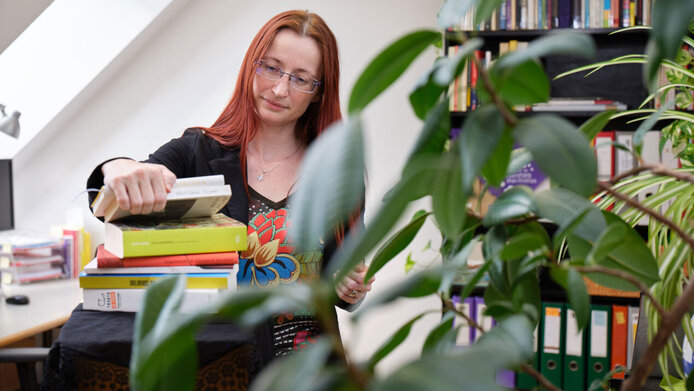Corona Fictions – what literature can tell us about the future

“Nous sommes en guerre,” was the ‘declaration of war’ France's President Emmanuel Macron launched against the coronavirus in his television address on the occasion of the first lockdown. During his speech, he repeated the word “war” six times, thereby activating images and associations in the minds of his compatriots. In a highly networked world, it is not only viruses that can spread within a few hours – narratives can go viral just as quickly. Such narratives reach an international audience, act as generators of meaning, and influence the reality of people's lives.
Interpretations of these corona narratives also feature in cultural productions of all kinds – in novels, television series, pop songs and music videos. “These literary and audio-visual productions can be summarised as 'Corona Fictions',” explains Yvonne Völkl, a literary and cultural studies scholar in the Department of Romance Studies at the University of Graz. “Corona Fictions show, for example, what impact health policy measures have on society, and how society perceives and assesses them.”
Culture helps to understand the world
During the first lockdown in March 2020, many people turned to culture to understand what was going on. Literary works such as The Plague by Albert Camus sold out in many bookstores, disaster movies like Steven Soderbergh's Contagion and Wolfgang Petersen's Outbreak reappeared in the most-watched movie rankings. “Literature can offer guidance on how to cope with extraordinary situations. It provides knowledge through the experience of others,” Völkl explains.
Passive reception was not the whole story, however. Many people began to forge their own narratives. Embedded in these texts, songs and films one finds the foundations, in terms of language and pictures, of how society deals with the coronavirus. “My team and I were fascinated by this aspect from the outset. It seems as if the production of Corona Fictions is a kind of coping strategy,” notes Yvonne Völkl. For her new research project, which is funded by the Austrian Science Fund FWF, Völkl and her team (consisting of Albert Göschl, Elisabeth Hobisch and Julia Obermayr) will be collecting such corona narratives over the next two years.
Underlying research questions
“We want to know which topics dominate the Corona Fictions: is it the fear of getting sick or of dying, is it the impact of isolation or the problems with care duties, or is it domestic violence?”, Völkl explains. Another research angle explores the similarities to “pandemic fictions” of the past. “We are interested in the overarching pandemic meta-narrative, which persists in contemporary Corona Fictions. We also investigate conceptual and terminological structures, such as war metaphors that represent the virus as the enemy, because such metaphors stimulate the collective memory of the audience.” The research project also addresses how Corona Fictions can contribute to individual and collective resilience, and explores the representation of social groups and minorities in the narratives.
Assisted by civil society
Yvonne Völkl and her team are predominantly analysing media genres from Romance-speaking countries but will also include widespread productions in other languages, such as the pandemic diary Wuhan Diary by the Chinese writer Fang Fang or the Covid-19 novel So ist die Welt geworden by the Austrian writer Marlene Streeruwitz. Since there are no central platforms that pool all Corona Fictions, the collection process is a challenge for a small team. But there is a solution: citizen science. In addition to more than half a dozen international and national project partners, civil society will be involved in the first phase of the project. Völkl: “The public will be able to provide us with indications of Corona Fictions using a digital platform.”
Relevance of literature to everyday life
Why is this research project important? “In a way you can predict the future by looking at literature – and I understand this term in a multimedia manner. There are different ways of coping with crises. From a historical perspective, people will almost always resort to the same coping principles,” explains the project manager. An in-depth investigation of cultural productions makes it possible to arrive at a better assessment of current situations, possible scenarios and resilience. “Pandemic fictions are an indicator of how social change happens and also of the possible consequences of one-sided social discourses.”
Role of humanities in crisis management
Political decision-making processes are mainly influenced by medical data and science. “Crisis management should also include the humanities. We should not underestimate their contribution to helping us deal with novel situations,” Völkl emphasises. The humanities and cultural studies make it possible to include socio-cultural aspects and thereby enrich existing data. “In this way, decisions can be made more inclusive for all citizens, and collateral damage from traumatising narratives can be prevented.” What are the consequences, for instance, of using war terminology? Cultural narratives can provide revealing insights in this context – and show linguistic ways out of the crisis.
Personal details
Yvonne Völkl is a literary and cultural studies scholar, currently researching and teaching at the Department of Romance Studies, University of Graz. Her research has taken her to French- and Spanish-speaking countries. As of June 2021, Völkl will head the research project “Corona Fictions. On Viral Narratives in Times of Pandemics”, which will collect and analyse cultural productions that emerge in the context of the coronavirus crisis. The project is scheduled to run for two years.
Contributions and links
Pandemic Research Group: From Pandemic to Corona Fictions: Narratives in Times of Crises, in: PhiN-Beihefte 24, 321-344, 2020
Project Website and collection of Corona Fictions https://corona-fictions.uni-graz.at





